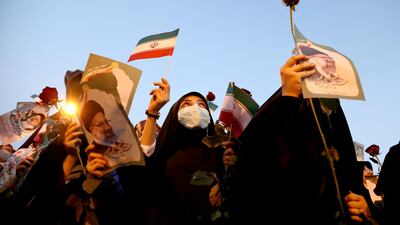The Iranian journalist Akbar Ganji, who was once imprisoned for his reporting on a string of political murders throughout the 1990s, once observed that Ruhollah Khomeini, Iran's first supreme leader and architect of the 1979 revolution, never made any specific promises to his countrymen regarding their economic prosperity. He preferred, rather, to craft their societal expectations around matters of religion and ideology.
It is a luxury Iran's presidents, charged with a more corporeal remit, do not enjoy. Ebrahim Raisi, Iran's newly elected President, knows that he is inheriting an electorate wading through dire economic straits. The country's own national statistics centre estimates that about half of Iranians live in poverty – up from a third before the Covid-19 pandemic. Inflation has shot up, as oil revenues have plummeted. Millions of livelihoods will depend on Mr Raisi's ability to turn the situation around.
Sceptics have grounds to be pessimistic. A jurist and longtime admirer of the current supreme leader , Ali Khamenei, Mr Raisi has spent more time in Iran's austere justice system than he has pondering economic or foreign policy. In Iran, which has been crippled by years of international sanctions over its nuclear programme, the two are linked; restoring economic health will require abandoning Iran's adversarial politics and antagonistic worldview.
Mr Raisi has already had sanctions imposed on him by the US for past actions incompatible with this spirit. In 1988, when the "chain murders" on which Ganji reported began, Mr Raisi was a state prosecutor who helped to fast-track the execution of thousands of other regime opponents. Despite growing calls from young Iranians for an inquiry, he remains unrepentant. He has since been instrumental in other crackdowns on dissent.
This is not a background that will help Iran's case in ongoing multilateral negotiations to revive a nuclear deal and lift the burden of sanctions. Such a deal was a cornerstone policy of the previous administration, but a favourite whipping post of hardliners, including Mr Raisi.
Today, its original moderate backers are largely irrelevant. A key architect of the deal, Foreign Minister Javad Zarif, admitted as much in audio recordings leaked in May, in which he complained that Iran's Islamic Revolutionary Guard Corps controls the country's foreign policy. But with moderates now out of office, Mr Raisi will no longer be able to pin all blame for the country's economic failures on his predecessors.
But this may afford him a peculiar opportunity to put his own stamp on an agreement that his allies once despised, if he so chooses. A determined effort to end western sanctions through a new deal could prove popular among cash-strapped citizens and back up Mr Raisi's claim that he will govern for all Iranians. With conservatives now in total control of the government, the international community also has a rare chance to engage figures close to the notoriously isolated and distrusting office of the supreme leader.
The ideology of popular resistance, espoused by the establishment since 1979's revolution, is no longer stacking up for many Iranians outside the political system. Mr Raisi will be aware that his victory came on the back of the lowest electoral turnout since the revolution. He may prefer to fall back on the hollow rhetoric of resistance politics. He should avoid giving in to temptation, however, not just for the interests of ordinary Iranians, but also for his political endurance.














